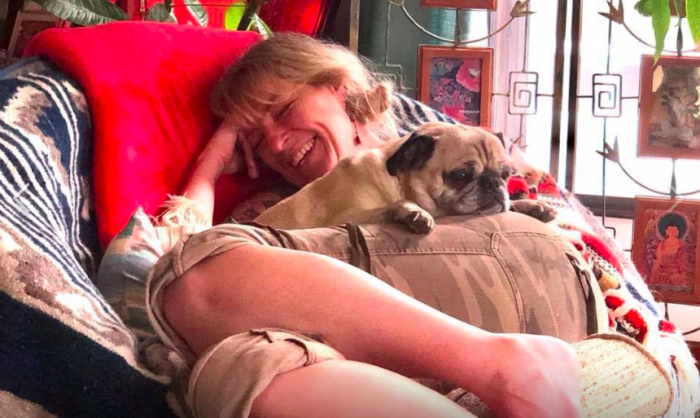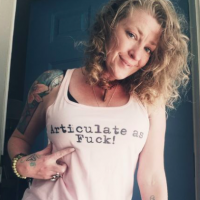There is something incredibly risky about feeling joy.
Even opening ourselves to our own creative energy, or falling in love—we could be rejected, we could fail.
To me, foreboding joy is our assurance that this won’t happen. If we stay sad, unfulfilled, shut down, depressed, and angry—we have less at stake. Many of us condition ourselves to accept this from an early age.
Foreboding joy is a term Brené Brown uses to describe how we shut down when we are feeling good. It makes something that should feel sweet and fulfilling sound ominous and inaccessible.
She gives the example of a family driving along, happily singing Christmas carols, and then asks, “What do you visualize happening next?” For many of us, a car crash, or a train hitting them—something awful—immediately leaps to mind.
Why must our brain take this idyllic scene and turn it into carnage? Brené says, it’s because joy is actually one of the most vulnerable emotions. Sure, we are vulnerable when we are sad, hurting, or grieving. Yet, there is something safe about it. We can’t get any lower.
“When you do things from your soul, you feel a river moving in you, a joy.”
~ Rumi
Think all the way back to when you were a kid, and you had some great thing you had made, or could do, and you showed a parent, or teacher and they ridiculed you for it, or didn’t have time to look and be present with your joy. In a situation like that, we go from being open to shutting down in an instant, and we often internalize the message—this isn’t safe.
We don’t learn to shut down joy on our own; we learn it together. You see, vulnerability is a language of mutuality and reciprocity. Our tenderness needs witnessing.
We’ve all heard the Zen koan, “If a tree falls in the woods, and no one is around to hear it, does it make a sound?” Elephant Journal asks me the same question, every time I publish a piece. “If a blog is posted onto a big website but it’s not shared, did it happen?” If we open the gates of our hearts, and no one is standing there—there’s nothing at risk—have we really opened?
To that I must say, yes and no. I spend a lot of time by myself, yet I maintain a thriving healing practice; have thousands of social media friends who I interact with regularly; and have a close relationship with my daughter and granddaughter, a few close, personal friends, and recently, a crush. I feel deliciously open most of the time. I dance around in my little cottage tucked into the mountains. I write, offering my time and energy to be of benefit.
Though I enjoy walking in the hills by myself and journaling, it is when I write something from my heart, for the public, and share it with my community, that I feel most creatively alive. Throw in the possibility of that piece getting me paid, being seen by thousands, or possibly hundreds of thousands of eyes, and it ups the risk factor. Though my belly drops a little, every bloody time I hit submit, I also feel wildly alive!—full of hope, and vulnerable. Maybe this will matter to someone else, too.
Though I enjoy my solitude, I yearn for relationships of all types. I love an evening chai tea, with a splash of whiskey enjoyed alone in my house. Throw in texting with a new flame who is kindling my passion and curiosity, and my heart skips a beat, my pupils dilate, my breath catches, then releases, as I move in and out of feeling comfortable, insecure, and turned on. I’d say that’s a good bit more vulnerable than tea for one, though that is nice too.
I feel awake, playful, engaged, and, yes, dare I tempt the fates? Joyful! I am aware of others’ stress, and difficulties, loss of income, loss of health, and even life—especially with the toll that the coronavirus is taking on society. I am utterly, achingly aware.
Should I not feel joyful because others are hurting? Should we all lower our standard of engagement to meet the lowest common denominator of social suffering? I don’t think so. I think the world needs our joy, when it is genuine. And it is from that joy that we also can birth compassion and empathy.
Wait, what? You mean I don’t have to be bogged down about the conditions of others suffering to care? Nope. I don’t think we do, but we cannot shut down to it, either, or we risk closing ourselves off to joy, and more importantly, our own humanity and that too, is reciprocal.
Joy is not a choice. We do not “just choose joy” no matter what the New Age flavor of the day, inspirational meme says. We choose to engage in the full scope of our humanity, and from that honesty and vulnerability, emotional alchemy occurs. In other words, joy is the reward for meeting the sh*t, head-on.
Joy does not come from turning our emotions into a popularity poll, in which we vote the least appealing contestants off the island. Joy comes from holding council for the hard, holy, and human—that means meeting all our emotions, feelings, and experiences with equanimity. That takes resilience.
Building resilience is the moment-to-moment process of separating our worth from our stories about our pain, but not our pain itself. Healing is not an exclusive privilege for those who can maintain positivity, that’s actually self-aggression. The wholehearted don’t compartmentalize our humanity—we embrace it. Joy does not come from spiritually bypassing pain, but by befriending it.
In order to heal, we need to be able to put our experiences into a relatable context, and claim our belonging, independent from any shame narratives. Brené talks about this too. Her research showed her that the most wholehearted people are not relentlessly positive, but often have active gratitude practices that help them to keep their experiences in perspective.
My own gratitude allows me to hold a more inclusive perspective of our shared humanity. I am safe, others are not. I am fed, others are hungry. I am healthy, others are ill. I have found my purpose, and passion and liberate energy daily to serve it, while others wander in the wastelands of depression and apathy. That breaks my heart wide open. And from that openness, I feel even more encouragement to be my bright, joyful self. I will not feel guilty about it. The world needs that right now, more than ever.
How do you forbid joy in your own life, and how will you create the conditions that allow it to flourish?
~


 Share on bsky
Share on bsky





Read 21 comments and reply